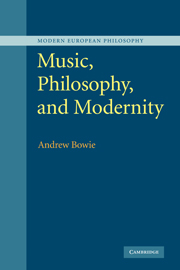Book contents
- Frontmatter
- Contents
- Preface
- Introduction
- 1 Form, feeling, metaphysics, and music
- 2 Music, language, and the origins of modernity
- 3 Rhythm and Romanticism
- 4 Hegel, philosophy and music
- 5 Music and the subjects of Romanticism
- 6 Music, freedom, and the critique of metaphysics
- 7 Pro and contra Wagner
- 8 Music, language, and being: Wittgenstein and Heidegger
- 9 Adorno: musical philosophy or philosophical music?
- Conclusion
- References
- Index
1 - Form, feeling, metaphysics, and music
Published online by Cambridge University Press: 15 October 2009
- Frontmatter
- Contents
- Preface
- Introduction
- 1 Form, feeling, metaphysics, and music
- 2 Music, language, and the origins of modernity
- 3 Rhythm and Romanticism
- 4 Hegel, philosophy and music
- 5 Music and the subjects of Romanticism
- 6 Music, freedom, and the critique of metaphysics
- 7 Pro and contra Wagner
- 8 Music, language, and being: Wittgenstein and Heidegger
- 9 Adorno: musical philosophy or philosophical music?
- Conclusion
- References
- Index
Summary
Form, meaning, and context
Philosophical writers on music who argue that wordless music does not mean anything sometimes refer to it as ‘pure form’. Peter Kivy says of Beethoven's Eroica Symphony, for example, that ‘it has no content to reveal, no message to decode’, and that in the teaching of the work ‘few instructors, trained in the modern analytical and musicological traditions as they are, will be tempted to attribute any meaning to it’ (Kivy 1993: 29), it being, ‘in a sense … pure contentless abstract form’ (ibid.: 30). Kivy's second claim is, of course, simply untrue: many professional ‘new musicologists’ would indeed attribute meaning to the Eroica. The sense in which it is supposed to be ‘pure contentless abstract form’ is not clear, but from the rest of Kivy's arguments it would appear to have to do with the idea that the Eroica does not designate anything. The idea that a form, especially a musical form, can be ‘pure’ should, though, already be doubtful on the basis of what was argued in the Introduction. For a form to be a significant form at all, it has to be understood as such, rather than merely registered as a series of unconnected data. Contextual and background factors that do not belong to the data themselves must come into play here, and so must the inferential apprehension of patterns of identity and difference, of the kind required for language use. It is only when there are such patterns that we need to interpret, so the very notion of form relies on the sense that there is something to be further understood. Forms are therefore always open to re-description when new contexts arise in which they take on a different significance.
- Type
- Chapter
- Information
- Music, Philosophy, and Modernity , pp. 15 - 45Publisher: Cambridge University PressPrint publication year: 2007



